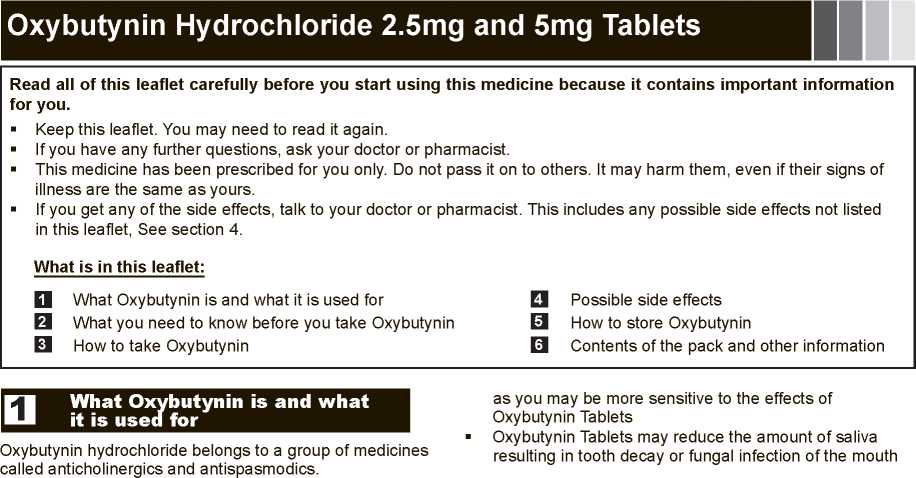Oxybutynin Hydrochloride 2.5Mg Tablets
Do not take if:
■ You are allergic (hypersensitive) to oxybutynin hydrochloride or any of the other ingredients of this medicine (listed in section 6 “Contents of the pack and other information”)
■ You have a problem with your gut (stomach or intestine) and it is blocked, perforated or not working properly, especially if you are elderly or unwell
■ You have a form of inflammatory bowel disease which can cause abdominal pain, bloody diarrhoea, fever and weight loss (severe ulcerative colitis) or sudden widening of the colon, which causes abdominal pain, fever or shock (toxic megacolon)
■ You have a blockage which makes it difficult to pass urine
■ You have a muscle weakness problem (myasthenia gravis)
■ You have increased pressure in the eye, sometimes sudden and painful with blurred vision or loss of vision (glaucoma)
■ You have an unstable heart due to a sudden loss of blood (acute haemorrhage)
■ You are breast feeding
Warnings and precautions
Talk to your doctor or pharmacist before taking
Oxybutynin if:
■ You have liver or kidney problems
■ You have obstructions of the stomach or intestines
■ You have indigestion or heart burn caused by a 'hiatus hernia' (where part of the stomach pushes through the diaphragm)
■ You are taking medicines to treat osteoporosis (drugs known as bisphosphonates)
■ You have damaged nerves, which can affect the way internal organs work (autonomic neuropathy)
■ You are taking this medicine in a hot climate as Oxybutynin Tablets can decrease your ability to sweat and may cause fever or heat stroke
■ You have an overactive thyroid gland (hyperthyroidism)
■ You have heart disease or heart failure
■ You have high blood pressure
■ You have an irregular, increased or rapid heart beat
■ You have an enlarged prostate gland
■ The person taking the medicine is a child (use is not recommended under 5 years of age)
■ You are elderly, frail (weak or in poor health) or a child,
Package Leaflet: Information for the patient

It works by relaxing the muscles of the bladder and stops sudden muscle contractions (spasms). This helps control the release of urine.
Oxybutynin Tablets can be used in adults to treat the following:
■ Loss of control in passing urine (urinary incontinence)
■ Increased need or urgency to pass urine
Oxybutynin Tablets can be used in children 5 years or older to treat the following:
■ Loss of control in passing urine (urinary incontinence)
■ Increased need or urgency to pass urine
■ Night time bedwetting, when other treatments have not worked
What you need to know before you take Oxybutynin
Children and adolescents
In children over 5 years of age, Oxybutynin hydrochloride should be used with caution as they may be more sensitive to the effects of the product, particularly the CNS and psychiatric adverse reactions.
Other medicines and Oxybutynin
Tell your doctor or pharmacist if you are taking, have recently taken or might take any other medicines, including those obtained without prescription. This includes herbal medicines. This is because Oxybutynin can affect the way some other medicines work. Also, some other medicines can affect the way Oxybutynin works.
In particular, tell your doctor if you are taking any of the following:
■ Atropine (used to treat glaucoma) and other anticholinergic medicines, such as some medicines for irritable bowel syndrome, asthma, incontinence, motion sickness or movement disorders associated with Parkinson's disease
■ Amantadine, for Parkinson's disease and to prevent some virus infections
Levodopa, biperiden for Parkinson's disease Phenothiazines, butyrophenones, clozapine and haloperidol, used to treat certain mental problems Digoxin or quinidine, used to treat heart problems Tricyclic antidepressants for depression e.g. amitriptyline, imipramine, dosulepin Dipyridamole, used to treat blood clotting problems Medicines used to treat dementia such as donepezil, rivastigmine, galantamine or tacrine (cholinesterase inhibitors)
■ Medicines used to make you feel sleepy (sedatives) or if you are feeling sick (nausea) or have vertigo - such as prochlorperazine or chlorpromazine
Taking Oxybutynin with alcohol
If you drink alcohol while taking these tablets, you may
become very drowsy.
Pregnancy and breastfeeding
If you are pregnant or breastfeeding, think you may be pregnant or are planning to have a baby, ask your doctor for advice before taking this medicine.
Pregnancy
If you are pregnant, might become pregnant or think you are pregnant; you should not take this medicine unless your doctor tells you to.
Breastfeeding
If you are breastfeeding you should not take this medicine as small amounts may pass in to your milk.
Driving and using machines
You may feel drowsy or have blurred vision whilst taking Oxybutynin Tablets. If this happens, do not drive or operate machinery.
Oxybutynin contains lactose
If you have been told by your doctor that you have an intolerance to some sugars, contact your doctor before taking this medicine.
How to take Oxybutynin
Always take this medicine exactly as your doctor has told you. Check with your doctor or pharmacist if you are not sure.
continued...
Hard to Read? Phone 0800 970 6115 for help
Till-Ver.5.1s